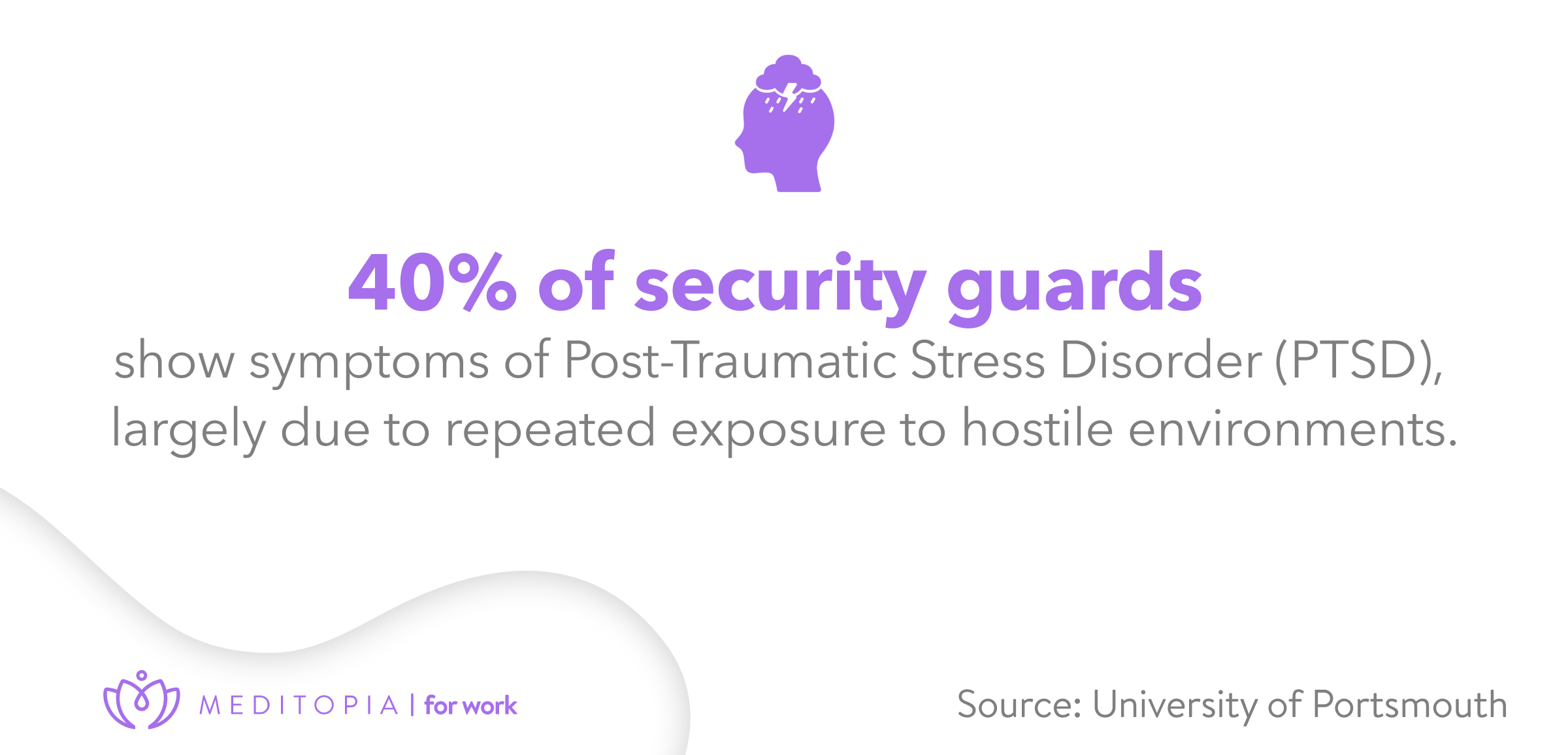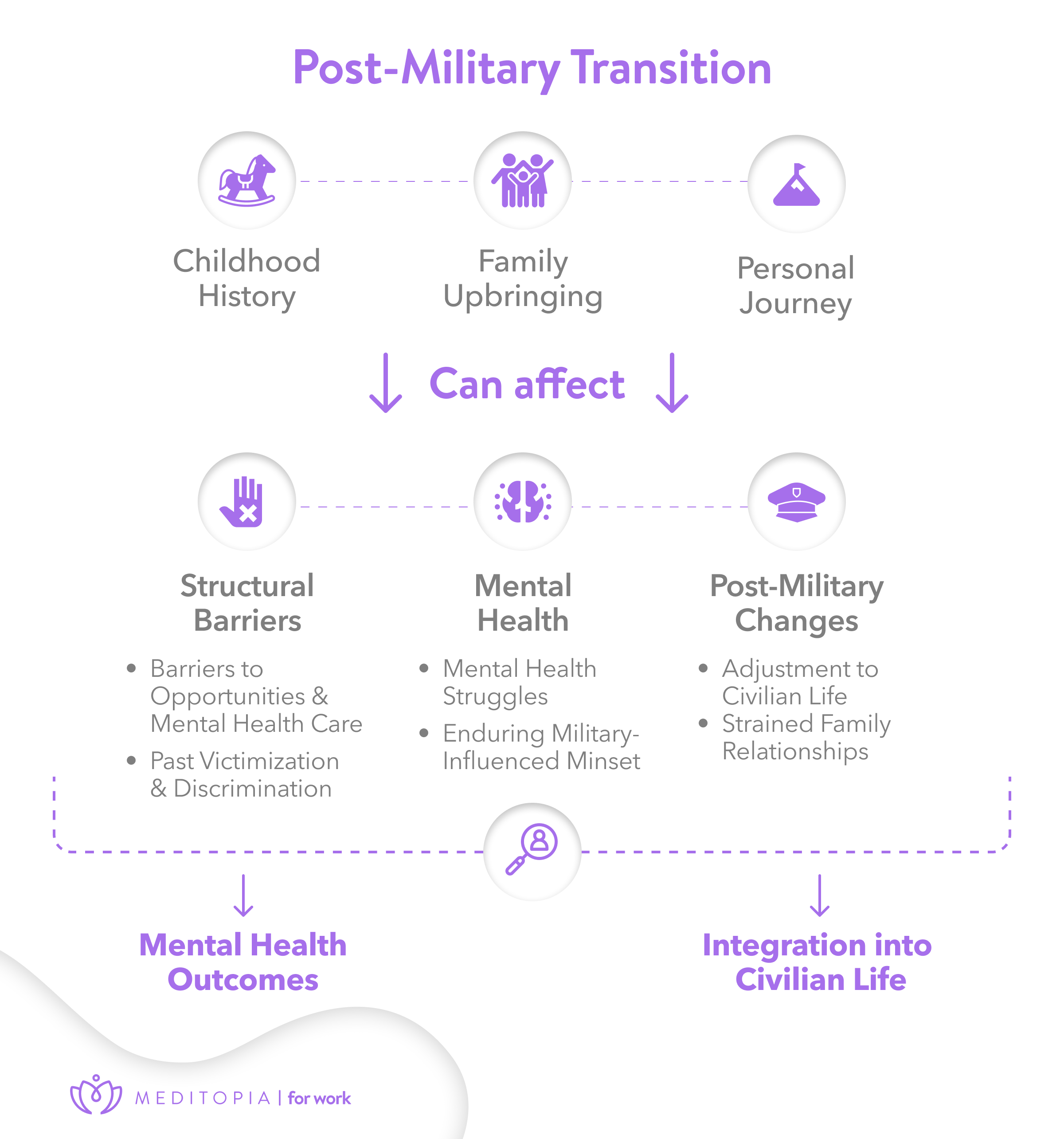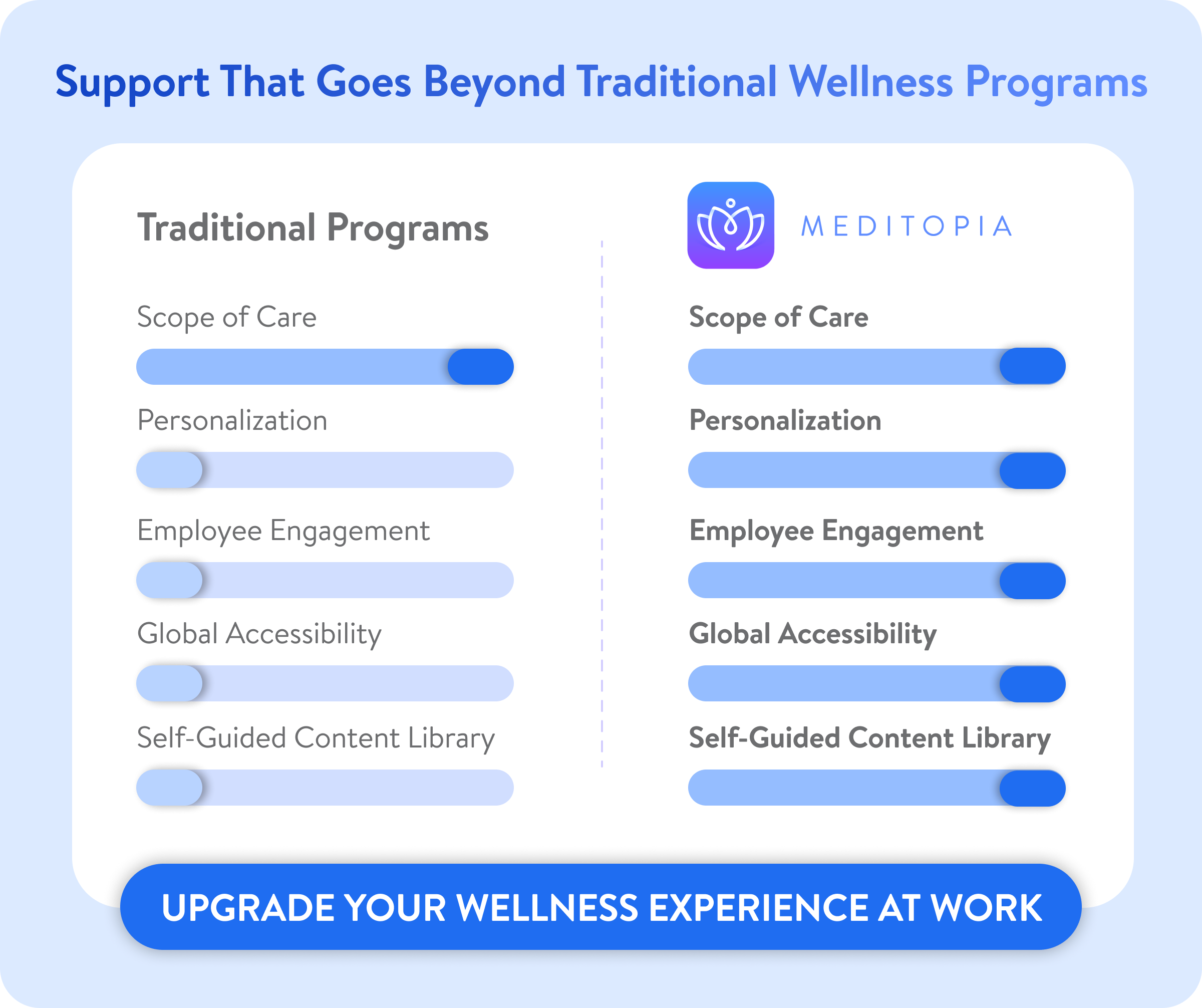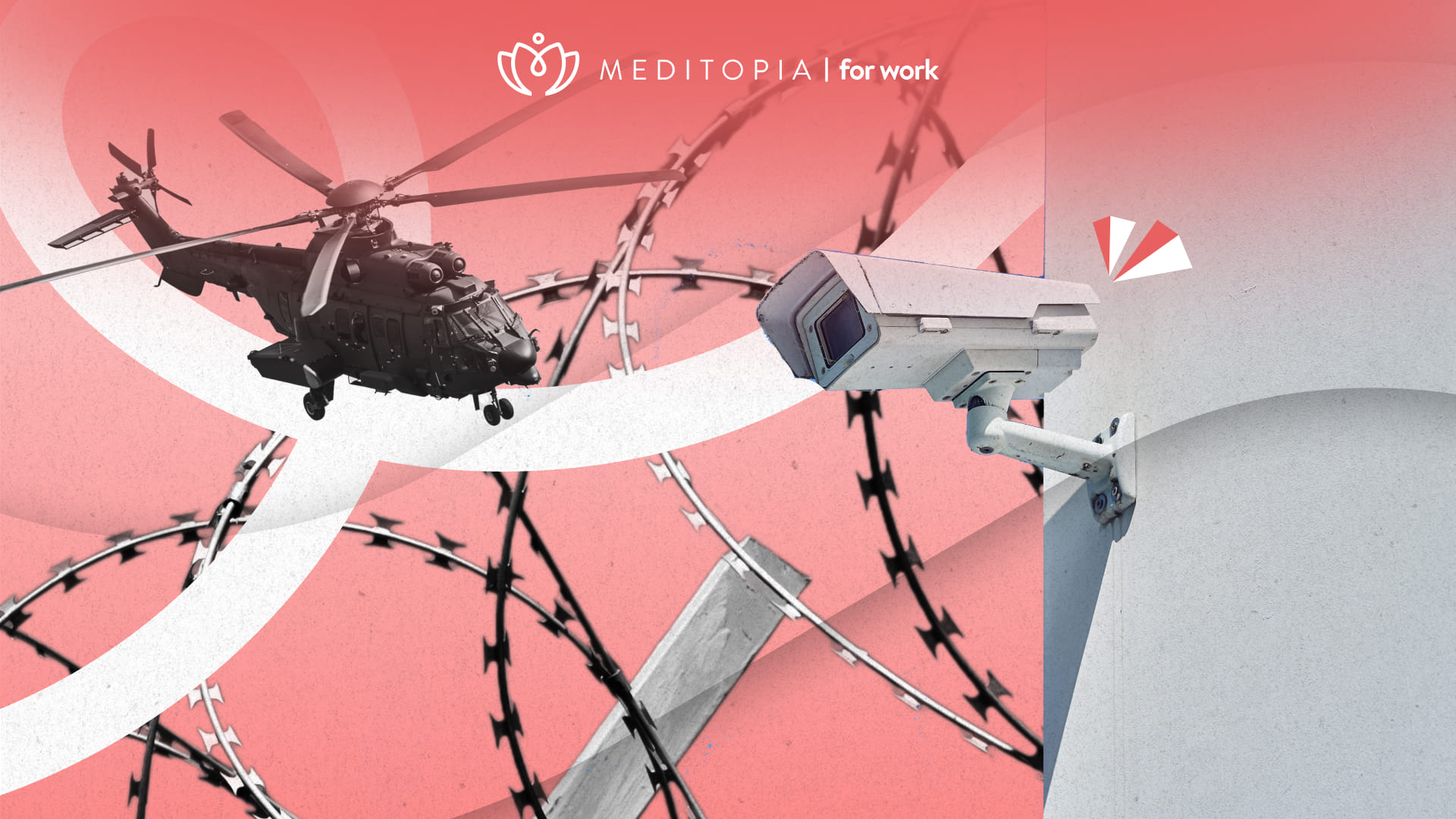Service in military and security roles demands not only peak physical capabilities but also exceptional mental resilience. More interestingly, a compelling figure highlights the stakes: up to 37.8% of military personnel experience symptoms of PTSD [1], while 40% of private security operatives experienced the same condition [2]. How can wellness programs support the military and security industry? Let's discover it.
Why Wellness Matters: Military & Security Benchmarks
The military and security sectors operate under conditions unmatched by most other industries. Lives may depend on quick, calculated decisions made under pressure, which is why burnout prevention and psychological readiness are as crucial as physical fitness. Here are some reasons wellness programs are so impactful necessary in this context:
- Trauma Exposure: Prolonged exposure to violence, threats, or traumatic events increases the risk of PTSD, depression, chronic trauma, and anxiety.
- Irregular Shift Work: Many roles demand 24/7 readiness, leading to on-the-job fatigue, sleep deprivation, and reduced workplace performance.
- Burnout Prevalence: Among military groups, from 0.9% to 40%. Emotional exhaustion, a key indicator, can affect up to 49.7% of personnel, with median values closer to 19% [3].
- Stigma: Many first responders underreport psychological symptoms due to fear of judgment or career repercussions. Around one in three report such stigma, and 33% cite practical or cultural obstacles to seeking care [4].
- High Physical and Emotional Demand: Daily duties involve constant vigilance, potential conflict, and emotionally draining tasks, contributing to rapid mental exhaustion.
- Global Deployments & Isolation: Frequent relocations or remote postings can erode social support systems and heighten emotional stress.

Common Mental Health & Wellness Challenges
Military and security professionals share many pressures—but they also face unique industry-specific challenges that wellness programs must directly address. Here's a breakdown of the most common obstacles impacting employee wellbeing and usage of wellness initiatives:
- High turnover & burnout: The private security industry reports turnover rates as high as 100–300% annually, often driven by poor schedules, lack of training, and low employee support [5].
- Meanwhile, military personnel face burnout rates ranging from 0.9% to 40%, depending on role and exposure levels.
- Workplace fatigue & sleep disruption: Due to shift work, night patrols, and emergency readiness, both sectors experience high levels of on-the-job fatigue. Security guards often report disrupted sleep patterns, which directly impacts attention and performance.
- Underutilization of wellness tools: Despite availability, many programs see low usage due to stigma, poor communication, or a mismatch between needs and offerings.
- Besides, only 1 in 4 security personnel surveyed in one UK study felt comfortable discussing mental health with their employer. This makes online therapy imperative to skip the stigma barrier.
- Trauma and moral injury: Security officers working in high-threat zones or corporate environments may witness violence or injustice, leading to long-term psychological effects, mirroring some of the trauma exposure seen in military and security settings.
- Low access in deskless environments: Both military and security professionals often lack regular access to work emails or computers, making it difficult to engage with desktop-based wellness platforms.
- This calls for mobile-first wellness solutions with seamless onboarding.

What an Effective Wellness Program Looks Like in Military & Security
To serve professionals in the military and private security sectors, wellness programs must be tailored not only to their operational demands but also to the deeply personal challenges they face. Here are the most critical components:
- 24/7 Accessibility: They often work around the clock, across time zones, or in active deployment. Wellness solutions like Meditopia for Work must be available anytime, anywhere, supporting both shift workers and those in the field, similar to how wellness programs for healthcare workers are designed for constant availability.
- Anonymous and Confidential Support: Anonymous access to mental health tools, self-guided support, and encrypted communication options reduce barriers to use.
- Mobile-First Engagement: Wellness programs must prioritize mobile apps, SMS-based check-ins, and push notifications over email-based access—mirroring wellness support hospitality platforms that serve staff who are always on the move.
- Culturally Aware & Multilingual Tools: Programs must also reflect cultural sensitivities, particularly in conflict-sensitive regions.
- Flexible Interaction Models: Some personnel thrive in peer-supported groups, while others need private, 1:1 guidance. Offering both formats can boost participation and trust.
- Resilience Training & Crisis Readiness: Programs should include modules on stress response, emotional regulation under pressure, and trauma coping techniques.
- Easy Onboarding & Low Friction Use: Onboarding should take less than five minutes, and tools must be intuitive ideally with auto-login and pre-loaded journeys based on job role.
Example Wellness Program Benefits for Military & Security
Here’s how tailored initiatives backed by expert wellness companies and targeted solutions can bring measurable advantages to military and security environments:
- Significant Reductions in Absenteeism: Research shows that comprehensive worksite wellness programs can reduce sick‑leave absenteeism by about 27%, along with decreasing healthcare costs by approximately 26%, and cutting workers’ compensation and disability claim costs by 32% [6].
- The average return on investment (ROI) can reach $5.81 for every $1 spent.
- Enhanced Organisational Mental Well‑Being: A positive psychosocial safety climate (PSC), indicating management’s genuine commitment to psychological safety, is linked to dramatic improvements: a potential 43% reduction in sickness absence and a 72% decrease in presenteeism [7].
- Boosted Resilience, Team Cohesion, and Performance: Military and security personnel benefit from programs that include mental health support and stress management programs, which improve morale, alertness, and adaptable response under pressure.
- Improved Retention and Recruitment Appeal: Demonstrating a clear investment in wellness fosters loyalty among skilled staff, reducing turnover in roles with high training and certification costs.
- Strategic Preparedness and Operational Readiness: Programs that include trauma-informed training, resilience coaching, and rapid recovery tools help personnel stay composed and mission-capable, even in crisis scenarios.
How Leading Military & Security Companies Approach Wellness
Let’s explore how prominent organizations supporting military and security professionals by designing and implementing wellness initiatives to enhance mental, emotional, and physical resilience.
Liberty Military Housing
Liberty Military Housing, an employee-owned housing services company serving military communities, launched "Live Well Liberty" to embed wellness into employees' daily lives.
Key Points:
- Built around four pillars: Movement, Nourishment, Purpose, and Connection, offering holistic wellness support.
- Provides free access to the Wellhub platform, linking employees to over 8,200 wellness partners and 15,000 gyms and studios.
- Enables 24/7 mental health support through Liberty Cares, via the Marketplace Chaplains and the MyChap app, offering confidential help via call, video, text, or email.
Results:
- While exact metrics weren’t disclosed, this multi-channel approach significantly broadens access to physical and mental resources across its workforce [8].
Semper Fi & America’s Fund
A non-profit dedicated to wounded, critically ill, and injured U.S. service members and their families, offering long-term wellness support.
Key Points:
- The Integrative Wellness Program offers targeted services such as recreation, post-traumatic growth resources, and other holistic wellness interventions.
Results: - Over $312 million in assistance provided to more than 31,000 service members and families, demonstrating significant scale and long-term impact.
- Recreational and competitive athletics via the Peter Murphy Sports Program supports psychological recovery and team cohesion [9].
Military OneSource
A U.S. Department of Defense-funded program offering free health and wellness resources for active-duty personnel and their families.
Key Points:
- Provides tailored support across physical, emotional, and mental health, via coaching, counseling, and wellness education.
- Offers wellness coaches, tools for leaders and service providers, and targeted wellness campaigns and resources for military communities.
Results:
- Though specific metrics are not publicly listed, Military OneSource remains one of the most comprehensive centralized wellness platforms for military populations. [10]
Guardian Group Services
Guardian Group Services, through its thought leadership and training resources, underscores the importance of holistic wellness for frontline security guards.
Key Points:
- Highlights trauma impact, especially for guards exposed to violence or emergencies.
- Recommends comprehensive support systems: mental health resources, stress management tools, and confidentiality through EAPs.
- Advocates for a supportive workplace culture, including peer support networks, counseling services, and inclusive environments that value work‑life balance.
Results:
- Not outcome‑specific, but the approach is aimed at fostering resilience, job satisfaction, and reduced burnout through integrated physical and emotional support [11].
The Future of Wellness in the Military and Security Industry
Emerging technologies, particularly AI, wearable devices, and mobile-first wellness apps, are transforming how military and security professionals engage with wellbeing programs. Here's how these innovations are reshaping the landscape:
- AI & Wearables: Wearables like Garmin, Whoop, and Oura are now used to monitor stress, fatigue, sleep, and heart rate in real time.
- Mobile-First Wellness: Apps now offer instant access to mental health resources, even in remote or shift-based settings. With personalized coaching and biometric integration, mobile-first tools ensure low-friction, 24/7 support.
- Why It Matters: These innovations allow HR and security leaders to spot burnout earlier, improve training safety, and deliver tailored support at scale—all while respecting privacy and operational constraints.
Meditopia for Work: Wellness That Fits Military & Security
When operating in high-stress, mission-critical environments, professionals need more than surface-level wellness support. Meditopia for Work was built to serve the unique needs of frontline teams, offering a flexible, confidential, and scalable platform that strengthens mental resilience and performance.

Here’s how Meditopia is reshaping wellness security:
- Tailored for Irregular Shifts and Operational Demands: With 24/7 mobile access, our content is designed for rotating shifts, night duty, and deployment cycles—making wellness easy to access, even in the field.
- PTSD and Trauma-Informed Resources: For high-risk teams regularly exposed to violence or trauma, Meditopia includes specialized modules and content that help users safely process stress, foundational to any military wellness initiative.
- Confidential & Anonymous Access: Privacy is essential in security and military sectors. Meditopia offers completely anonymous use, giving employees the psychological safety to engage with wellness without fear of stigma or oversight.
- Webinars, Workshops & Live Sessions: Our platform includes interactive options such as expert-led webinars and workshops, which foster team-level learning and build emotional resilience in real time.
- Corporate Wellbeing Challenges: Gamified wellness journeys, such as breathing, walking or sleep improvement challenges, help boost engagement and morale while aligning with organizational health goals.
- Real-Time Crisis Support: In urgent situations, employees can access emotional first-aid and mindfulness content specifically designed to manage acute stress or traumatic events—whether after a violent confrontation or a critical incident.
- Multilingual and Culturally Aware Tools: Available in over 14 languages, Meditopia ensures your global teams receive support in ways that resonate with their cultural and emotional realities.
- Fast Implementation and HR-Friendly Dashboards: Launch within minutes via QR codes or direct app links. HR leaders also gain real-time engagement analytics and insights without the administrative burden.
Meditopia transforms traditional wellness offerings into an integrated military wellness program that truly supports the people who keep others safe. It’s wellness that fits, because it’s built for your world.
Explore Employee Wellness Programs Across Industries
Employee wellness takes many forms across industries, shaped by distinct challenges and needs.See how different sectors care for their people and explore the evolving wellness landscape.

























